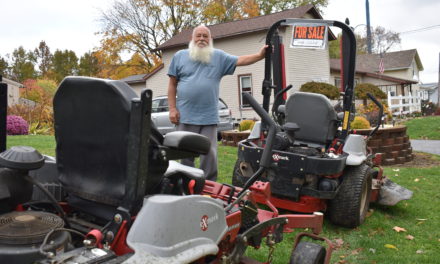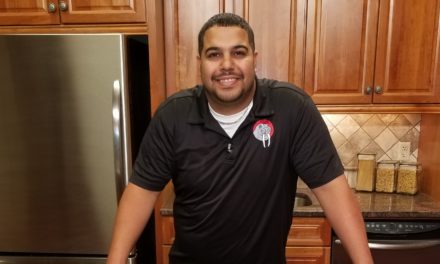Contractors working for Highland Field Services LLC completed in mid-June the drilling of an injection well that would dispose of waste water from the oil and gas industry, said Rob Boulware, company spokesman.
The company planned to start testing the well after the July 4 holiday, he said.
Highland received permission to drill five wells on the property on Route 7 in Brookfield, but decisions on whether to operate that well and drill more would be made after testing, he said.
As the company proceeds with its plans, local opponents said they will not give up the fight. Jane Spies of Frackfree America National Coalition, which has worked hand-in-hand with Brookfield Citizens Against Injection Wells, said opponents are planning another town hall-style public meeting and more roadside protests; contacting legislators and supporting legislation that would halt fracking and injection wells; and examining legal options.
“In no way, shape or form do we accept that they are going to inject,” she said. “We are absolutely not going away.”
Brookfield trustees held a meeting concerning the injection wells on June 1, which attracted a number of area politicians, county officials, opponents and members of the public.

Trumbull County Commissioner Frank Fuda, center, speaks a meeting about the injection wells proposed for Brookfield. Also shown are state Sen. Glenn Holmes, left, and Trumbull County Health Commissioner Frank Migliozzi.
The trustees have sent a number of letters to county and state officials expressing their opposition to the wells based on the argument that the wells are a threat to the health, safety and welfare of residents, but the few that have responded did not offer encouragement.
“At this time, we are not in a position to investigate broad environmental impacts as they relate to underground injection control,” reads one letter from the Ohio Department of Health.
The department said the Ohio Department of Natural Resources regulates injection wells and recommended that any resident who believes he or she is experiencing negative health effects as a result of injection should document the effects with a physician and contact the Trumbull County Health Department.
Jason Toth, assistant Trumbull County prosecutor, said ODNR has sole authority over injection wells and suggested contacting legislators about changing the law – an option that has been tried without success.
State Rep. Glenn Holmes, whose district includes Brookfield, said he meets with ODNR officials regularly “to try and get them to understand what’s going on here in Brookfield Township and Trumbull County.”
As for his colleagues in the General Assembly, “The legislature does not have an appetite to change legislation as it relates to injection wells,” Holmes said.
Other legislators look at injection wells as a “necessary evil,” he said.
“They’re looking for a scientific reason” to stop injection, he said, and there has not been one his colleagues are willing to accept.
“Right now, you’re cursed because your geology is that which would accept fluid,” Holmes said.
Injection wells force waste fluids into porous rock that is sandwiched between layers of denser rock.
Well opponents also are fighting against national energy policy, Holmes said. Domestic gas and oil drilling lessens the reliance on imported natural resources and has helped keep those commodity prices down, Holmes said.
“In order for America, in order for Ohio, to have any kind of energy independence, they have to go after this shale plate,” he said, referring to the fracking process that extracts gas and oil from shale. “It’s the fourth largest reserve in the world. They’re not going to do anything to substantially eliminate that potential.”
That’s why Holmes favors pushing for advances in technology that would remove the harmful elements of the waste water that results from drilling, so that the water can be reused in a non-drilling capacity, eliminating the need to inject.
Highland has said it reuses the waste water in drilling new wells, but that there aren’t always new wells to take the material to.
Although he considers injection to be “dumping waste in somebody’s backyard,” Holmes said Highland has not been unreasonable. It agreed to bring in a street sweeper to clean dirt off Route 7 and erected sound barriers when drilling to cut down on noise, he said.
Trumbull County Health Commissioner Frank Migliozzi said the county health department is conducting a study to try to gauge the health effects injection wells have on county residents. It is looking at rates of diseases and ailments such as cancer, asthma, skin and eye irritation and cardiovascular disease.
“We have the exact dates when they started pumping wastewater into each one of these wells,” Migliozzi said. “What we’re doing is a retrospective study to go back in time, look at rates of various diseases, and see if it changed as we moved into the activity coming into your area.”
There are about 20 injection wells operating in Trumbull County.
In top photo, Hubbard Township Trustee Fred Hanley speaks at a meeting about the injection wells proposed for Brookfield.










Gotta keep fighting, folks. Never give oil and gas an inch. First come injection wells then comes frackquakes and contamination. The best thing you can do is work to oust the Republican legislature that removed local control over any aspect of oil and gas production. They ware the ones that said it was A-OK to drill a well within 150 – 200 ft. of your house. They are the ones that have allowed forced pooling so that even if you refuse to sign a lease, they can drill under your property anyway. Time to rise-up and say enough! Help get out the vote and get people to the polls that will vote out pro-oil and gas interests. Fight smart and you will win.